What are determiners? What are possessive determiners? Determiners are used in English to introduce a noun. However, that’s a rather simplistic definition of determiners. Determiners are a class of words in English that specify which noun we are referring to in a sentence.
Consider the following example:
The determiner that specifies that we are talking about the noun book.
The three most common determiners in English are a, an, and the. We use them frequently in English. Check out the following sentences:
- Where are the keys? I think I left it at home.
- An apple a day keeps the doctor away.
- Have you seen my pen?
- What is this thing? I’ve never seen it before.
- Can you give me another glass instead? This one is dirty.
- She took all our money.
Very few students are attending classes nowadays.
As we can see from the above examples, determiners are much more than a, an, and the. It’s a popular misconception that these three words are the only determiners in English.
It can be complicated to identify determiners in a sentence, for both native and non-native speakers. But if you pay close attention to the role they play in a sentence, you can easily figure out which word is a determiner and which isn’t.
Tip: There can only be one determiner in a noun phrase.
What are determiners?
Determiners are either articles or adjectives that point toward a particular noun(s). Numbers can be determiners as well (in that case, they act as adjectives). There are multiple definitions of determiners. But there’s a common thread in all of them — determiners are words that point toward/indicate nouns.
Broadly, there are nine types of determiners (here again, there isn’t a universal consensus).
The nine types of determiners are:
- Indefinite article: a, an
- Definite article: the
- Pronouns and possessive determiners: his, her, their, my, mine
- Demonstratives: that, those, these, this
- Difference words: other, another
- Numbers: one, two, forty, two thousand
- Distributives: neither, either, half, both, all, every
- Pre-determiners: what, quite, rather, such
- Quantifiers: few, little, much, many, lot
Let’s use each of these determiners in sentences to notice their function:
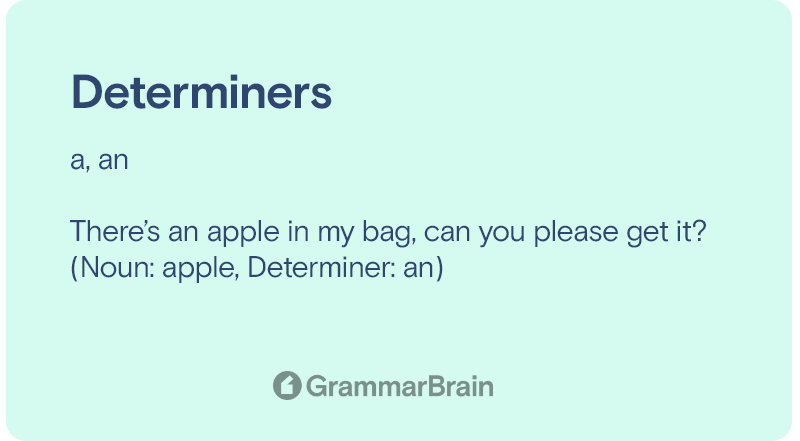
a, an
There’s an apple in my bag, can you please get it? (Noun: apple, Determiner: an)
Are you looking for a job? (Noun: job, Determiner: a)
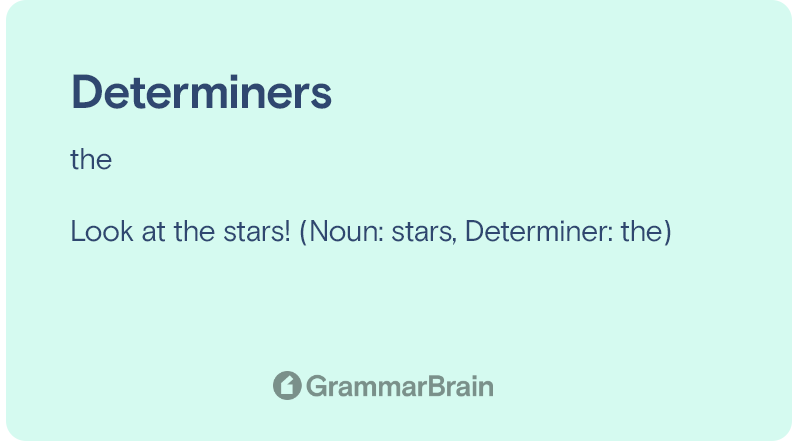
the
Look at the stars! (Noun: stars, Determiner: the)
There goes the airplane (Noun: airplane, Determiner: the)
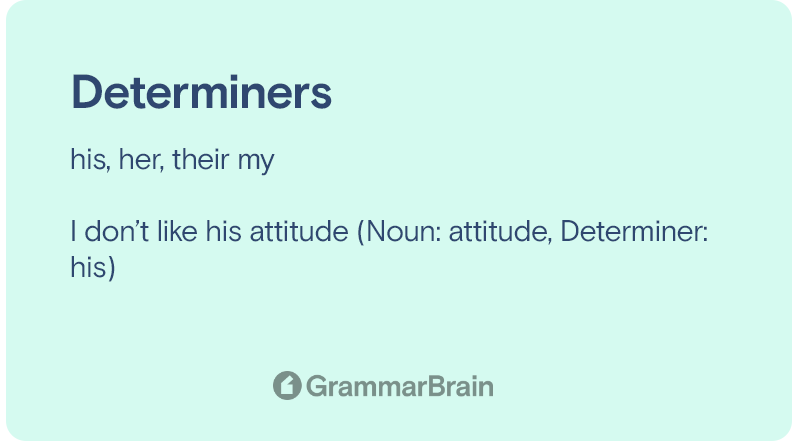
his, her, their, my
I don’t like his attitude (Noun: attitude, Determiner: his)
Her intellect mesmerized the audience (Noun: intellect, Determiner: her)
Their efforts won’t go in vain ((Noun: efforts, Determiner: their)
I think my book is with you ((Noun: book, Determiner: my)
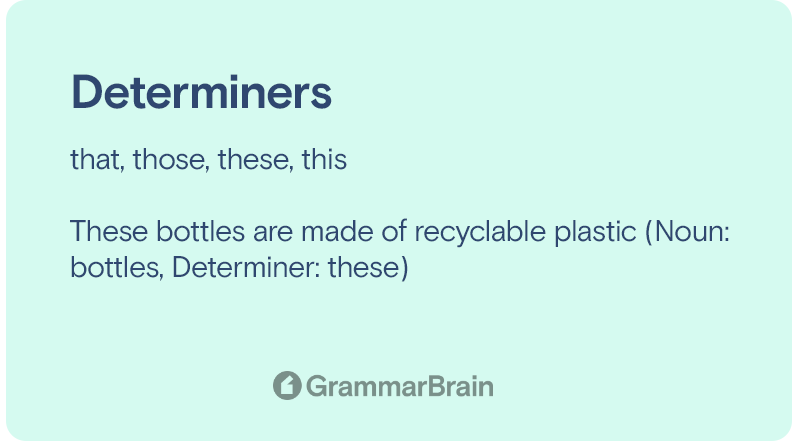
that, those, these, this
These bottles are made of recyclable plastic (Noun: bottles, Determiner: these)
Those guys will never understand my point (Noun: guys, Determiner: those)
Look at that stunning picture! (Noun: picture, Determiner: that)
This is a dog (Noun: dog, Determiner: this)
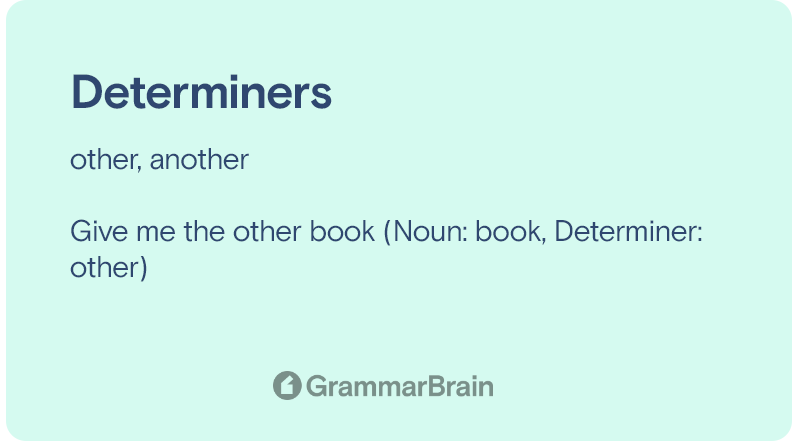
other, another
Give me the other book (Noun: book, Determiner: other)
Can you pour me another glass of soda? (Noun: soda, Determiner: another)
Numbers (one, forty, ten thousand, etc.)
All you need is one person who believes in you (Noun: person, Determiner: one)
Ten thousand soldiers were marching forward (Noun: soldiers, Determiner: ten thousand)
I could see twenty people coming toward me (Noun: people, Determiner: twenty)
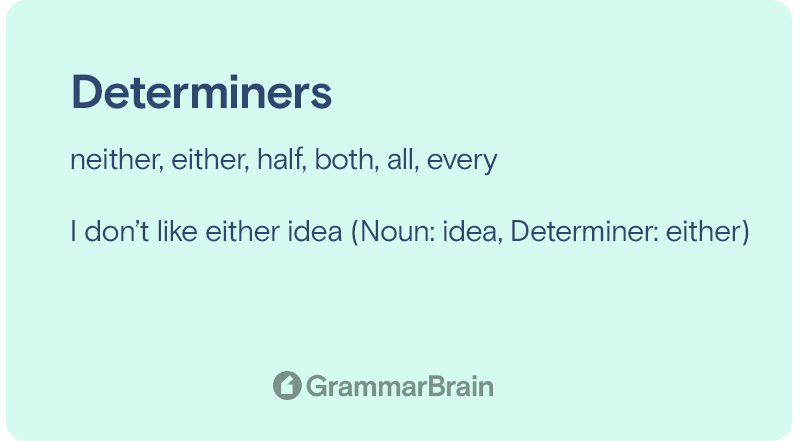
neither, either, half, both, all, every
I don’t like either idea (Noun: idea, Determiner: either)
Neither of my parents ever scolded me (Noun: parents, Determiner: neither)
Can you give me half a glass of water? (Noun: water, Determiner: half)
Both leaders had mutual respect for each other (Noun: leaders, Determiner: both)
He owns every house in this neighborhood (Noun: house, Determiner: every)
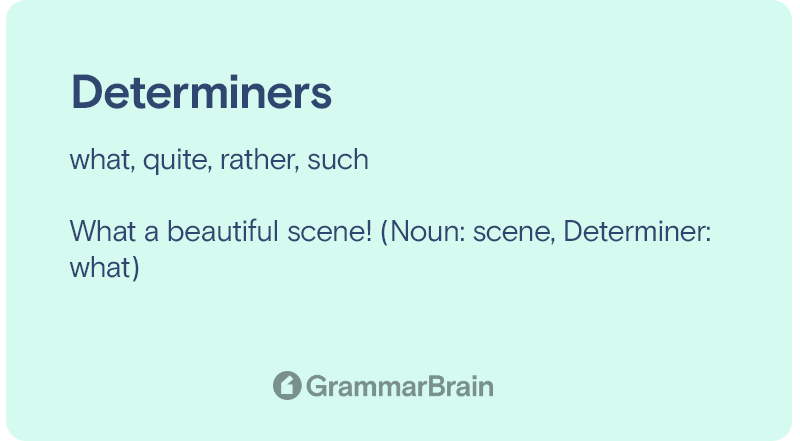
what, quite, rather, such
What a beautiful scene! (Noun: scene, Determiner: what)
They had such a memorable time with us (Noun: time, Determiner: such)
It was a rather small hotel (Noun: hotel, Determiner: rather)
I had quite an experience! (Noun: experience, Determiner: quite)
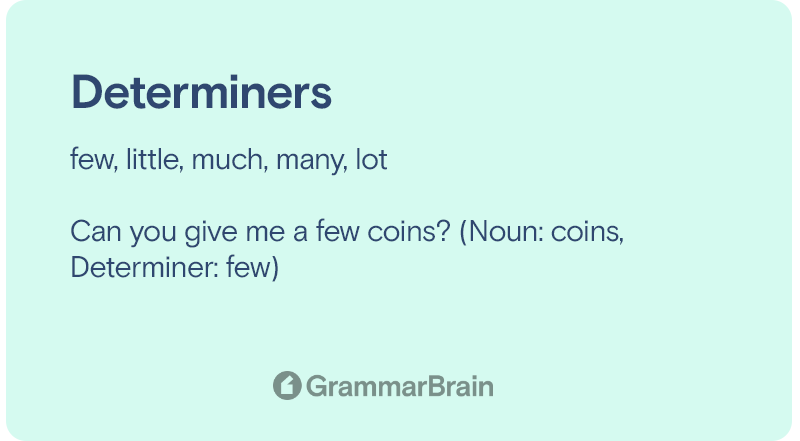
few, little, much, many, lot
Can you give me a few coins? (Noun: coins, Determiner: few)
There’s very little milk left in the fridge (Noun: milk, Determiner: little)
How much money do you have? (Noun: money, Determiner: much)
There are many opportunities ahead (Noun: opportunities, Determiner: many)
I have seen a lot of things in the past (Noun: things, Determiner: lot)
Pronouns and determiners: Are they the same?
As we mentioned earlier, determiners can be ambiguous in many cases. Pronouns and determiners seem similar in many instances, but there are key differences between the two. However, the following words can act as both pronouns and determiners.
Some of these words are:
- This
- That
- These
- Those
- His
- Her
- Their
- Few
- Many
These words can be used as both determiners and pronouns. But in both cases, they tell us where a thing, person, or idea is in relation to something else. Consider the following sentence:
This is where I want to be
In the above sentence, ‘this’ tells where the speaker wants to be. The key difference between demonstrative pronouns and demonstrative determiners is simple:
Pronouns replace nouns. Determiners point toward a noun.
In the example sentence, ‘this’ does not clarify what the sentence is talking about. As a result, it’s a demonstrative pronoun and not a demonstrative determiner.
To better understand the difference, we have to first learn more about pronouns.
Pronouns
Pronouns are words that replace nouns. There are several types of pronouns, like relative pronouns, personal pronouns, possessive pronouns, demonstrative pronouns, and interrogative pronouns.
Some words act as both pronouns and determiners. As learners of English, it can be quite confusing to tell the difference between the two. Remember the primary functions of pronouns and determiners, and it’ll be easy to differentiate between the two.
Let’s take a look at examples to better understand the difference:
Where is my pen?
This is the place where I first saw him.
In the first sentence, where is a determiner while in the second sentence, it’s a pronoun. Why? Because in the first sentence, the word where asks about the location of the noun (pen).
In the second sentence, the word where is a relative pronoun. Relative pronouns are a special category of pronouns that help us join two parts of a sentence.
If you pay close attention to the second sentence, you can locate the determiner as well.
This is the place…
The word this acts as the determiner in the second sentence. It tells us where the place is and points toward a noun (place).
The above example shows how pronouns are different from determiners though the same words act as both.
Let’s go through a few more examples of pronouns and determiners:
She always helps others in their endeavors.
Can you pass it on to the other person?
Can you notice the difference in the way the word other/s is used in the above examples? Let’s break it down:
In the first sentence, the word others is replacing words like people, friends, etc. The point of the sentence is that the pronoun (she) helps someone else. As a result, it’s replacing a noun (people, friends) in the sentence.
Now let’s look at the second example:
In the second sentence, the word other is pointing toward a noun – person. It’s clear that the word is not replacing any noun in the sentence. If we were to replace the word other in the second sentence, we would have to write something like this:
Can you pass it on to him/her/them?
We can see that the word (other) doesn’t replace any noun. But when we use the pronouns him, her, or them, they replace a noun (person). As a result, we will call these words (him/her/them) pronouns and not determiners.
Possessive pronouns and determiners
The difference between pronouns and determiners becomes much trickier when we consider possessive pronouns.
The following words are possessive pronouns:
His, hers, its, ours, yours, theirs, mine
Note: You can determine whether these words are used as determiners or pronouns only if you have their context. That means we need a paragraph or multiple lines of text to tell the difference between the two.
Consider the following sentences:
His* name is Jonathan. He^ works at an IT firm. However, the laptop he^^ is working on is not his**. It’s mine. I let him use my laptop because he^^^ lets me use his*** PlayStation.
His*: The first his of the sentence introduces Jonathan. It doesn’t replace any noun. Thus, it’s a determiner.
He^: The second he is a pronoun since it replaces the noun Jonathan.
He^^: The third he is also a pronoun since it replaces the noun Jonathan.
His**: The word his here is a pronoun, though it doesn’t replace any noun. Rather, it states ownership of the laptop (not Jonathan’s). As a result, it’s a possessive pronoun and not a determiner (because it isn’t pointing toward any noun).
Mine: The word mine is a possessive pronoun and is never used as a determiner.
Him: Him is a pronoun because it replaces Jonathan’s name.
My: The phrase my laptop in the sentence is a determiner because it points toward a noun (laptop) and tells us about its ownership.
he^^^: Pronoun because it replaces Jonathan’s name.
his***: Here again, we are talking about his PlayStation. Since his tells us about the ownership of the PlayStation, it acts as a determiner.
Pronouns and determiners: How to tell the difference
Until now, we have discussed the major differences between pronouns and determiners. Here are the main points to keep in mind while differentiating between the two:
- Determiners are used before nouns, pronouns are used alone (not before nouns)
- Determiners point toward nouns, pronouns replace nouns
- Articles (a, an, the) are determiners and can’t be used as pronouns
- Determiners can modify nouns, pronouns, and noun phrases. They don’t modify verbs, adverbs, or adjectives
By keeping these fundamental rules in mind, you will be able to tell the difference between pronouns and determiners for any sentence.
Here are some sentences for you to implement everything you have learned till now. Locate the determiners and/or pronouns in the following sentences:
- Look at that! Isn’t it amazing?
- The glass is half full.
- Can you pass me that bag?
- I don’t have any money left with me.
- The things he did were not good for his career.
- My grandfather’s plan was a huge success.
- Thousands of people go hungry every night.
- What are your thoughts on this business plan?
- Global warming is a global concern.
- Though the decision was completely hers, her parents were against it.
Here are the answers (The determiners are in bold while the pronouns are in italics)
- Look at that! Isn’t it amazing?
- The glass is half full.
- Can you pass me that bag?
- I don’t have any money left with me.
- The things he did were not good for his career.
- My grandfather’s plan was a huge success.
- Thousands of people go hungry every night.
- What are your thoughts on this business plan?
- Global warming is a global concern.
- Though the decision was completely hers, her parents were against it.
Once you have a grasp of the basic difference between pronouns and determiners, you can figure out how they are used in sentences. However, it requires practice and the habit of referring to a dictionary whenever you get confused. Time, practice, and a deeper understanding of pronouns and determiners will make the subject easier.
Demonstrative adjectives and demonstrative determiners
The rules of English grammar have a few gray areas. One such gray area is the difference between demonstrative adjectives and demonstrative determiners.
Adjectives are words that describe specific attributes of a noun.
Here are a few simple examples:
Mary has a red dress.
It was a huge success.
I am a devout follower of the Lord.
In the above sentences, locating the adjective is straightforward. The words red, huge, and devout modify the nouns dress, success, and follower respectively. These adjectives are not determiners since they don’t refer to any noun.
However, the differences become blurred when you consider the following sentences:
I have fifty songs downloaded on Spotify.
I have known these dogs since childhood.
That pen is mine.
In the above sentences, the words fifty, these, and that act as both determiners are demonstrative adjectives. There is no way we can make a distinction between the two.
Demonstrative adjectives are defined as adjectives that specify the position of a noun. We can apply the same definition to determiners as well. As a result, it becomes increasingly difficult to tell the difference between the two.
Ordinal numbers (first, second, third, etc.) are also considered demonstrative adjectives by some rule books. At the same time, they can also be determiners.
Consider the following example:
He is the first boy in the class.
My parents were the second people to move into this neighborhood.
Our school is celebrating its 23rd anniversary.
In each of the above sentences, the ordinal numbers first, second, and 23rd are used as demonstrative adjectives. But we can also argue that they are used as determiners.
There is no clear distinction between demonstrative determiners and demonstrative adjectives. Both modify nouns and tell us about their location in relation to other things.
How to use determiners in speech and writing
Till this point, we have primarily discussed the role of determiners in the English language. Now, we’ll discuss some general rules and best practices for using determiners in sentences.
Some best practices for using determiners are as follows:
1. Be careful not to overuse determiners. Too many determiners in a sentence can make it sound cluttered and difficult to understand.
2. When in doubt, it is usually best to err on the side of using too few determiners rather than too many.
3. Pay attention to the order of determiners in a sentence. The order can affect the meaning of the sentence, so it is important to be aware of it.
4. Make sure the determiners agree in number and gender with the nouns they are modifying.
5. Determiners don’t replace nouns – they point at nouns and tell us something about their location, number, state, etc. Keep this difference in mind to easily differentiate between determiners and pronouns.
6. Apart from demonstrative adjectives, other forms of adjectives are starkly different from determiners in their role in the English language.
7. When confused about whether a word is a determiner or not, refer to an online dictionary to see the possible uses of the word.
8. Remember that determiners are always used before nouns. This makes them different from pronouns.
9. It’s easy to identify determiners when you understand the role of a specific word in a sentence.
FAQs
What are determiners?
Determiners are words that modify nouns or pronouns and signal whether the reference is specific or nonspecific. They tell us something about the location or relation of a noun with reference to other factors.
What are the different types of determiners?
The different types of determiners are
- Indefinite article
- Definite article
- Pronouns and possessive determiners
- Demonstratives
- Difference words
- Numbers
- Distributives
- Pre-determiners
- Quantifiers
What is the difference between a and an?
The difference between a and an is that a is used before words that begin with a consonant sound and an is used before words that begin with a vowel sound.
What is the difference between the words this and that?
What is the difference between the words my and mine?
The difference between my and mine is that my is used as a possessive determiner before a noun, while mine is used as a pronoun.
What is the difference between the words some and any?
The difference between some and any is that some is used to refer to a specific, known quantity, while any is used to refer to any quantity.
What is a difference word?
Other and another are two difference words. These words tell us that a noun is not another noun. When used as determiners, these words help us point toward something instead of something else.
What are pronouns?
Pronouns are words that replace nouns. These are generally short words that add lucidity and flow to writing and speech. Examples of pronouns are her, his, he, she, they, etc.
What are possessive pronouns?
Possessive pronouns are words that indicate ownership. Consider the following sentence:
My mother gave me this book, it’s not mine.
In the above sentence, the word mine acts as the possessive pronoun since it talks about the ownership of the book.
What is the difference between a possessive pronoun and a determiner?
A possessive pronoun replaces a noun while a determiner is used before a noun to point toward it. Words like mine, hers, and theirs are possessive pronouns, while words like his and her can be both possessive pronouns and determiners.
What is an adjective?
An adjective is a word that describes a specific attribute of a noun (red hat, angry man, etc.)
What is a demonstrative adjective?
A demonstrative adjective specifies the location of a noun. The following words are demonstrative adjectives:
- This
- These
- That
- Those
Are demonstrative adjectives and demonstrative determiners the same?
Yes, demonstrative adjectives and demonstrative determiners play the same role in the English language.
Are determiners required before a singular noun?
Yes, determiners are required before a singular noun but are optional when introducing plural nouns.
Sources:
- What Is A Demonstrative Adjective? | Thesaurus.com
- What Is A Determiner? | Thesaurus.com
- Pronouns – Explore What is, Definition, Types and Examples (byjus.com)
- Demonstrative pronoun or demonstrative determiner | English grammar (eslbase.com)
- Determiners | EF | Global Site
- What Is a Determiner? (yourdictionary.com)
- How do you know if a word is being used as a pronoun or a determiner? | Learning English Grammar | Collins Education (collinsdictionary.com)
- Pre-determiners – Such, What, Rather, or Quite (skesl.com)
- Possessive Pronouns and Determiners in English Grammar (lingolia.com)
Inside this article
Fact checked:
Content is rigorously reviewed by a team of qualified and experienced fact checkers. Fact checkers review articles for factual accuracy, relevance, and timeliness. Learn more.
Core lessons
Glossary
- Abstract Noun
- Accusative Case
- Anecdote
- Antonym
- Active Sentence
- Adverb
- Adjective
- Allegory
- Alliteration
- Adjective Clause
- Adjective Phrase
- Ampersand
- Anastrophe
- Adverbial Clause
- Appositive Phrase
- Clause
- Compound Adjective
- Complex Sentence
- Compound Words
- Compound Predicate
- Common Noun
- Comparative Adjective
- Comparative and Superlative
- Compound Noun
- Compound Subject
- Compound Sentence
- Copular Verb
- Collective Noun
- Colloquialism
- Conciseness
- Consonance
- Conditional
- Concrete Noun
- Conjunction
- Conjugation
- Conditional Sentence
- Comma Splice
- Correlative Conjunction
- Coordinating Conjunction
- Coordinate Adjective
- Cumulative Adjective
- Dative Case
- Determiner
- Declarative Sentence
- Declarative Statement
- Direct Object Pronoun
- Direct Object
- Diction
- Diphthong
- Dangling Modifier
- Demonstrative Pronoun
- Demonstrative Adjective
- Direct Characterization
- Definite Article
- Doublespeak
- False Dilemma Fallacy
- Future Perfect Progressive
- Future Simple
- Future Perfect Continuous
- Future Perfect
- First Conditional
- Irregular Adjective
- Irregular Verb
- Imperative Sentence
- Indefinite Article
- Intransitive Verb
- Introductory Phrase
- Indefinite Pronoun
- Indirect Characterization
- Interrogative Sentence
- Intensive Pronoun
- Inanimate Object
- Indefinite Tense
- Infinitive Phrase
- Interjection
- Intensifier
- Infinitive
- Indicative Mood
- Participle
- Parallelism
- Prepositional Phrase
- Past Simple Tense
- Past Continuous Tense
- Past Perfect Tense
- Past Progressive Tense
- Present Simple Tense
- Present Perfect Tense
- Personal Pronoun
- Personification
- Persuasive Writing
- Parallel Structure
- Phrasal Verb
- Predicate Adjective
- Predicate Nominative
- Phonetic Language
- Plural Noun
- Punctuation
- Punctuation Marks
- Preposition
- Preposition of Place
- Parts of Speech
- Possessive Adjective
- Possessive Determiner
- Possessive Case
- Possessive Noun
- Proper Adjective
- Proper Noun
- Present Participle
- Prefix
- Predicate



